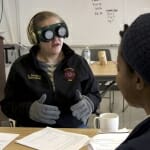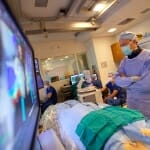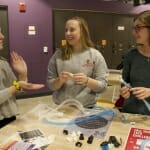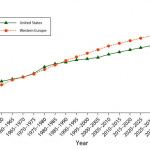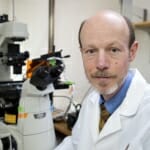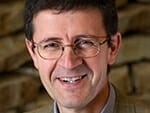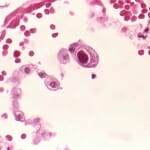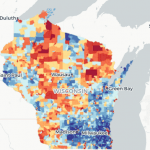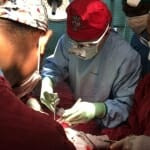Tag School of Medicine and Public Health
Dementia: Can a “friendly visit” play a role in keeping seniors safe at home?
As part of a grant in the UW–Madison School of Medicine and Public Health. Wisconsin paramedics take training intended to help them become “friendly visitors” with seniors showing signs of dementia. Read More
Doctor’s brainstorm being realized at UW–Madison spinoff
Atrility hopes to market a device that would help in pediatric heart surgery. The design was begun by students in UW–Madison’s department of biomedical engineering. Read More
Undergrads design ventilator device; form company to aid newborns during surgery
Undergraduates in biomedical engineering created an improved "wye" that connects airway tubes for infants during surgery. They've applied for a provisional patent. Read More
Blue “blood” gives residents innovative microsurgery training
To train residents in microsurgery, UW physicians have developed the “blue-blood” chicken thigh simulator. Residents suture blood vessels together in chicken thighs perfused with IV fluid dyed blue. Read More
UW-Madison life-expectancy paper nabs top honor from APHA
Work published by three University of Wisconsin researchers regarding decreasing the gap in life expectancy of the United States population compared to European peers, earned top honors from the American Public Health Association. Read More
Professor seeking to offer eye screenings throughout state remotely
A UW–Madison professor helped start program that offers a way for patients with diabetes to easily access eye screenings, and now she and her fellow researchers are studying how to make such programs more widely available across Wisconsin. Read More
‘Raw, peer-to-peer’ film starting conversations about addiction at Wisconsin high schools
Wisconsin high school students are learning to talk about addiction through a film and accompanying curriculum prepared by Wisconsin Eye and funded by the Wisconsin Partnership program at the University of Wisconsin School of Medicine and Public Health. Read More
Stem Cells @ 20: The Stem Cell and Regenerative Medicine center galvanizes stem cell research
In Wisconsin, key to growing and empowering the community of stem cell researchers is the UW–Madison Stem Cell and Regenerative Medicine Center. Read More
Scientists discover cause of aging-related disease in mice, then reverse its symptoms
UW–Madison researchers have shown that mice making too much of a human protein called AT-1 show signs of early aging and premature death, which are also symptoms of the human disorder progeria. Read More
Cell therapy is the future, and Wisconsin is the place, UW–Madison expert tells Technology Council
UW–Madison has doctors willing to guide the studies that will make or break cell therapy companies. “If you are a clinician, you need a pioneer spirit to do something that has never been done before,” Jacques Galipeau says, “and there are already many like that here.” Read More
Map helps guide public health decision-making
“We want this to be a tool that everyone can use,” said Amy Kind, an associate professor of medicine. “We hope this will be a catalyst to ... eliminate U.S. health disparities.” Read More
Surgery residency goes global
The UW surgery department is offering for the first time an elective international rotation. The first participant was a surgery resident, and he has just returned from a month in Ethiopia. Read More
Commencement: The weekend in photos
From elaborately decorated mortarboards to beaming graduates, commencement weekend is full of camera-ready moments. Read More
CWD prions discovered in soil near Wisconsin mineral licks for the first time
New research out of the UW–Madison has, for the first time, detected prions responsible for chronic wasting disease (CWD) in samples taken from sites where deer congregate. Read More
UW funds will improve app to help vets at ‘Dryhootch’ coffeehouses
Dryhootch Coffeehouse is a place dedicated to the physical and mental health of U.S. veterans, and now it will use a new grant from the UW–Madison School of Medicine and Public Health to improve an app that connects vets to vets. Read More
Study destroys myth that motorcycle helmets break necks
The motorcycle crash victims who did not wear helmets had twice as many injuries to the cervical spine, commonly known as the neck, the study says. Read More
UW professor leads national study on effectiveness of mentoring in STEMM
The National Academy of Sciences study focuses on undergraduate and graduate mentoring of individuals traditionally marginalized in STEMM. Read More

